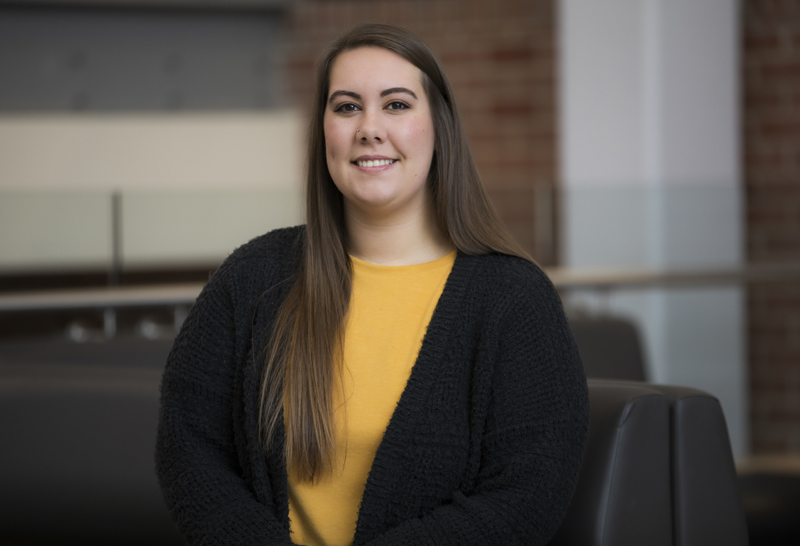Sustainable communities spotlight: Gillian Sloan
Interdisciplinary master's program combines environmental studies, public affairs, geography

The sustainable communities program is teaching students how to create policies that’ll last.
“We’re trying to get people to think differently about the systems that challenge sustainability,” said George Homsy, an assistant professor of public administration and director of the sustainable communities program. “If we want people to recycle more and drive less, we have to change the systems in which we operate. The default way needs to be the sustainable way.”
Homsy works with all of the sustainable communities students—teaching core classes, running their colloquium and doing the preliminary advising needed to guide students through the program. Eventually each connects with a professor who can help the students specifically in their field of interest.
After graduating from Tufts University, Homsy got his master’s in regional planning at Cornell University. He returned to Cornell after several years of working as an urban planner to receive his doctorate in planning. Dabbling in work that varied from journalism to policy making, Homsy found his niche connecting Binghamton University with the local community.
“George makes it important for us to go out into the community and work with people, to engage with community members and kids,” said Gillian Sloan, a master’s student in the sustainable communities program. “We visited Eco-Village and toured green construction in Tompkins County to learn how the people try to live more lightly on the land—and we learned about the challenges of being green, especially when you think about social equity and economic development.”
Sloan is currently getting her double master’s degree in sustainable communities and public administration through the University’s three-year program. The Auburn, N.Y., native grew up near Owasco Lake, which inspired her to work on watershed management and water rights.
“I’m interested in figuring out how to bridge the gap between farming communities and the cities around them,” Sloan said. “I’ve realized that the farms [near Owasco Lake] create runoff, but they’re also regulated like crazy; they’re spending so much money to make sure the lake isn’t polluted. The townspeople like to blame the farmers, but it’s all of us.”
Sloan majored in environmental studies with a concentration in policy planning and law at SUNY College of Environmental Science and Forestry, but wanted to go elsewhere for her master’s degree. Though she came in as a public administration student, she quickly realized that sustainability was just as important to her.
“I came down here and I really loved it. The program was very new, there were few students in it and I kind of fell in love with that,” Sloan explained. “Many schools don’t have sustainable community programs; they have sustainability or sustainable energy, but this program is broad. It helps us think holistically about interconnections and complexity in community systems and allows you to focus on a concentration within the program.”
With dreams of solving environmental issues through community initiatives, Sloan was able to further her studies through the new perspectives that Binghamton University’s program offers.
“Within Binghamton’s sustainability and public administration programs, there’s not a lot of science classes, which was what I had at [SUNY] ESF,” Sloan said. “Here, they’re focused on social science-based and communication-based courses. I love colloquium because it’s a one-hour class where speakers, professionals and professors come to talk to us about what we’re doing.”
As an interdisciplinary program that combines aspects of public affairs, geography and environmental studies, the sustainable communities program aims to give students a community-based approach to environmental reform.
“It’s balancing environmental, economic and social equity, but not with that burden falling on the backs on underprivileged people,” Homsy explained. “It’s all about making the campus and the community more holistically sustainable places.”
The program emphasizes the importance of communicating with the people who are a part of each community.
“My expertise can’t solve everything, I don’t know what happens in local neighborhoods,” Homsy said. “I have to talk with people and work with people to help people in these neighborhoods help themselves.”
Working in tandem with the people they aim to help ensures that policymakers can align their policies and initiatives with community needs.
“That’s the whole idea of sustainable communities: we want to create professionals who will understand the systems in the world and do that work in tandem with the people who live in those systems,” Homsy said. “If you don’t work with people, you’ll fail.”
The small program is close-knit in every sense, and the students have built a strong community of their own.
“I know all of my classmates really well,” Sloan said. “We hang out, we have potlucks, we go out for drinks, and it’s important because it leads into the idea of a sustainable community. We are a community and this is important in the long run.”
Sloan was inspired and motivated as she watched the first of her peers graduate last year.
“I actually watched the first group of grad students from this program graduate and we had a meeting where all of the profs from the program came and the students did their thesis and capstone presentations, which was so cool,” Sloan said. “I knew what they were doing, but seeing their research come to fruition was incredible and it gave me confidence that I can do my thesis, too.”
Though the program may be small, these students are striving toward cultivating big changes.
“The program really helps you to realize there are jobs in this field and you have the ability to actually make change in communities,” Sloan said. “I’m excited to actually work and accomplish things for communities. Learning is important but I can’t wait to get out there and get things moving.”

